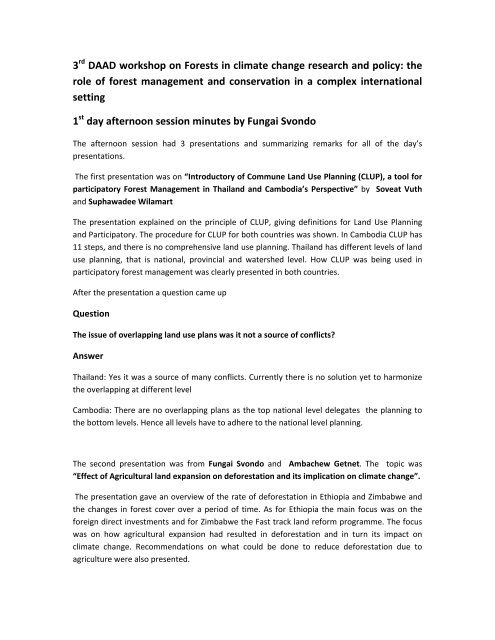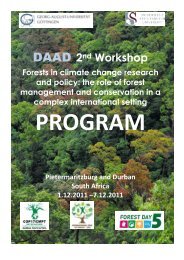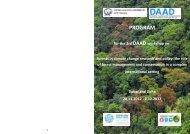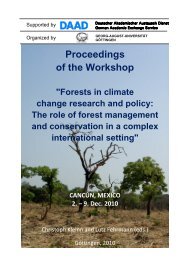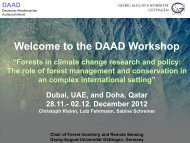3rd DAAD workshop on Forests in climate change research and policy
3rd DAAD workshop on Forests in climate change research and policy
3rd DAAD workshop on Forests in climate change research and policy
You also want an ePaper? Increase the reach of your titles
YUMPU automatically turns print PDFs into web optimized ePapers that Google loves.
3 rd <str<strong>on</strong>g>DAAD</str<strong>on</strong>g> <str<strong>on</strong>g>workshop</str<strong>on</strong>g> <strong>on</strong> <strong>Forests</strong> <strong>in</strong> <strong>climate</strong> <strong>change</strong> <strong>research</strong> <strong>and</strong> <strong>policy</strong>: the<br />
role of forest management <strong>and</strong> c<strong>on</strong>servati<strong>on</strong> <strong>in</strong> a complex <strong>in</strong>ternati<strong>on</strong>al<br />
sett<strong>in</strong>g<br />
1 st day afterno<strong>on</strong> sessi<strong>on</strong> m<strong>in</strong>utes by Fungai Sv<strong>on</strong>do<br />
The afterno<strong>on</strong> sessi<strong>on</strong> had 3 presentati<strong>on</strong>s <strong>and</strong> summariz<strong>in</strong>g remarks for all of the day’s<br />
presentati<strong>on</strong>s.<br />
The first presentati<strong>on</strong> was <strong>on</strong> “Introductory of Commune L<strong>and</strong> Use Plann<strong>in</strong>g (CLUP), a tool for<br />
participatory Forest Management <strong>in</strong> Thail<strong>and</strong> <strong>and</strong> Cambodia’s Perspective” by Soveat Vuth<br />
<strong>and</strong> Suphawadee Wilamart<br />
The presentati<strong>on</strong> expla<strong>in</strong>ed <strong>on</strong> the pr<strong>in</strong>ciple of CLUP, giv<strong>in</strong>g def<strong>in</strong>iti<strong>on</strong>s for L<strong>and</strong> Use Plann<strong>in</strong>g<br />
<strong>and</strong> Participatory. The procedure for CLUP for both countries was shown. In Cambodia CLUP has<br />
11 steps, <strong>and</strong> there is no comprehensive l<strong>and</strong> use plann<strong>in</strong>g. Thail<strong>and</strong> has different levels of l<strong>and</strong><br />
use plann<strong>in</strong>g, that is nati<strong>on</strong>al, prov<strong>in</strong>cial <strong>and</strong> watershed level. How CLUP was be<strong>in</strong>g used <strong>in</strong><br />
participatory forest management was clearly presented <strong>in</strong> both countries.<br />
After the presentati<strong>on</strong> a questi<strong>on</strong> came up<br />
Questi<strong>on</strong><br />
The issue of overlapp<strong>in</strong>g l<strong>and</strong> use plans was it not a source of c<strong>on</strong>flicts?<br />
Answer<br />
Thail<strong>and</strong>: Yes it was a source of many c<strong>on</strong>flicts. Currently there is no soluti<strong>on</strong> yet to harm<strong>on</strong>ize<br />
the overlapp<strong>in</strong>g at different level<br />
Cambodia: There are no overlapp<strong>in</strong>g plans as the top nati<strong>on</strong>al level delegates the plann<strong>in</strong>g to<br />
the bottom levels. Hence all levels have to adhere to the nati<strong>on</strong>al level plann<strong>in</strong>g.<br />
The sec<strong>on</strong>d presentati<strong>on</strong> was from Fungai Sv<strong>on</strong>do <strong>and</strong> Ambachew Getnet. The topic was<br />
“Effect of Agricultural l<strong>and</strong> expansi<strong>on</strong> <strong>on</strong> deforestati<strong>on</strong> <strong>and</strong> its implicati<strong>on</strong> <strong>on</strong> <strong>climate</strong> <strong>change</strong>”.<br />
The presentati<strong>on</strong> gave an overview of the rate of deforestati<strong>on</strong> <strong>in</strong> Ethiopia <strong>and</strong> Zimbabwe <strong>and</strong><br />
the <strong>change</strong>s <strong>in</strong> forest cover over a period of time. As for Ethiopia the ma<strong>in</strong> focus was <strong>on</strong> the<br />
foreign direct <strong>in</strong>vestments <strong>and</strong> for Zimbabwe the Fast track l<strong>and</strong> reform programme. The focus<br />
was <strong>on</strong> how agricultural expansi<strong>on</strong> had resulted <strong>in</strong> deforestati<strong>on</strong> <strong>and</strong> <strong>in</strong> turn its impact <strong>on</strong><br />
<strong>climate</strong> <strong>change</strong>. Recommendati<strong>on</strong>s <strong>on</strong> what could be d<strong>on</strong>e to reduce deforestati<strong>on</strong> due to<br />
agriculture were also presented.
The follow<strong>in</strong>g questi<strong>on</strong>s came up<br />
Questi<strong>on</strong>s<br />
Was REDD+ go<strong>in</strong>g to improve the situati<strong>on</strong> <strong>in</strong> both countries?<br />
Answer: Zimbabwe- The issue of tenure security <strong>and</strong> transparency needed to addressed first<br />
before the <strong>in</strong>troducti<strong>on</strong> of the REDD+ project.<br />
Ethiopia- All l<strong>and</strong> is nati<strong>on</strong>alized, hence there is need for the government <strong>and</strong> people to work<br />
together if the REDD+ is to produce results.<br />
Due to the agricultural expansi<strong>on</strong> <strong>in</strong> both countries were there any c<strong>on</strong>flicts?<br />
Answer: Plenty of c<strong>on</strong>flicts <strong>in</strong> both countries which are yet to be solved<br />
What is meant by tenure?<br />
Answer: The way <strong>in</strong> which rights to l<strong>and</strong> are held by a community or nati<strong>on</strong><br />
The third presentati<strong>on</strong> was from Check Abdel Kader Baba. The topic was “ C<strong>on</strong>servati<strong>on</strong> <strong>and</strong><br />
Multiple Purpose Dam Management <strong>in</strong> North Ben<strong>in</strong>: Challenges <strong>and</strong> Opportunities”<br />
The presentati<strong>on</strong> showed how water management could be an opportunity for reforestati<strong>on</strong><br />
focus<strong>in</strong>g <strong>on</strong> the stakeholders <strong>in</strong> this particular project, their <strong>in</strong>terests, challenges, opportunities<br />
<strong>and</strong> c<strong>on</strong>clusi<strong>on</strong>s. The project showed the water protecti<strong>on</strong> functi<strong>on</strong> of forests <strong>and</strong> its l<strong>in</strong>k to<br />
access clean water by the people <strong>and</strong> communities surround<strong>in</strong>g the dam. The presentati<strong>on</strong> also<br />
highlighted other forest benefits besides carb<strong>on</strong> sequestrati<strong>on</strong>.<br />
After the presentati<strong>on</strong> the follow<strong>in</strong>g questi<strong>on</strong>s arose.<br />
Questi<strong>on</strong>s<br />
What is meant by ecologically adapted species <strong>in</strong> terms of tree species?<br />
Answer: Species that are better suited for the soil <strong>and</strong> climatic c<strong>on</strong>diti<strong>on</strong>s <strong>in</strong> this area. Some<br />
exist<strong>in</strong>g tree species have been pruned <strong>and</strong> the cause is not clear.<br />
Who decides the areas to be afforestated?<br />
Answer: The local NGO which is a part <strong>and</strong> <strong>in</strong>itiator of the project.<br />
Were the locals aware of the importance of water <strong>and</strong> forests or some<strong>on</strong>e told them?
Answer: Some already had an idea of the importance of water <strong>and</strong> forest before the project was<br />
started.<br />
What are the benefits of the project for the villagers?<br />
Answer: Assess to water for people <strong>and</strong> animals, <strong>and</strong> also a graz<strong>in</strong>g area for the animals<br />
Lastly Professor I Nengah Surati Jaya from Ind<strong>on</strong>esia gave the summariz<strong>in</strong>g remarks for all the<br />
presentati<strong>on</strong>s of the day.


